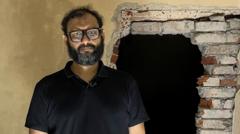A clandestine jail, unearthed near Dhaka International Airport thanks to survivor testimonies, has exposed a network of secret detention centers linked to political repression under former Prime Minister Sheikh Hasina's rule. Survivors recount atrocious conditions and fear of reprisal, calling for justice and accountability as the nation grapples with its painful past.
Secret Jail Cell Discovered Near Dhaka Airport: Survivors Share Harrowing Accounts

Secret Jail Cell Discovered Near Dhaka Airport: Survivors Share Harrowing Accounts
Investigators uncover a hidden detention center tied to the former Prime Minister's regime in Bangladesh, revealing widespread political oppression and torture.
A recent investigation into political detentions in Bangladesh led to the shocking discovery of a secret jail situated mere steps from Dhaka International Airport. The hidden facility, obscured behind a hastily constructed wall, was unveiled through the vivid recollections of Mir Ahmad Bin Quasem, who spent eight years confined within its dark, oppressive walls.
Quasem, who emerged as a vocal opponent of ousted leader Sheikh Hasina, described the chilling sounds of aircraft landing that helped him lead investigators to the military base where the cells were located. The haunting memories of his extended incarceration remain vivid, as he recalls the claustrophobic cell devoid of light, where he "felt like being buried alive."
His testimony, along with similar accounts from other victims, has drawn attention to a broader, systematic pattern of enforced disappearances and torture allegedly orchestrated by the elite counter-terrorism unit known as the Rapid Action Battalion (RAB), acting upon directives from Hasina herself. Prosecutor Tajul Islam alleges that these incidents occurred with the Prime Minister's tacit approval. However, the ruling party vehemently denies responsibility, claiming that such violations were not sanctioned by the government.
Quasem's harrowing exploration of his former prison cell provides a frightening glimpse into the grim realities faced by detainees, who often spent years in small, windowless chambers. He believes that justice must be pursued to hold accountable those who inflicted such suffering on their fellow citizens. Despite being released, he and others live in continuous fear of encountering their former captors on the streets.
Throughout the country, NGOs and human rights activists have recorded hundreds of cases of enforced disappearances, with many victims remaining unaccounted for. As Quasem reflects on the need to share these stories, the call for transparency and justice resonates stronger than ever in a nation transitioning towards democracy.
Survivors like Iqbal Chowdhury and Atikur Rahman Rasel also shared their traumatic experiences of abduction and mistreatment during politically motivated detentions, further illustrating the urgent need for accountability. The ongoing challenge for Bangladesh's new leadership lies in acknowledging this dark chapter to prevent its recurrence and to ensure justice for its citizens.
As the nation strives to heal from the memories of repression, these voices echo a resolute demand for an end to such atrocities, highlighting the importance of creating a safer future for generations to come.






















